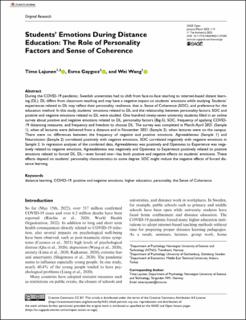| dc.contributor.author | Lajunen, Timo Juhani | |
| dc.contributor.author | Gaygısız, Esma | |
| dc.contributor.author | Wang, Wei | |
| dc.date.accessioned | 2023-10-30T08:37:41Z | |
| dc.date.available | 2023-10-30T08:37:41Z | |
| dc.date.created | 2023-03-17T13:51:39Z | |
| dc.date.issued | 2023 | |
| dc.identifier.citation | Sage Open. 2023, 13 (1), . | en_US |
| dc.identifier.issn | 2158-2440 | |
| dc.identifier.uri | https://hdl.handle.net/11250/3099298 | |
| dc.description.abstract | During the COVID-19 pandemic, Swedish universities had to shift from face-to-face teaching to internet-based distant learning (DL). DL differs from classroom teaching and may have a negative impact on students’ emotions while studying. Students’ experiences related to DL may reflect their personality, resilience, that is, Sense of Coherence (SOC), and preference for the education method. In this study, students’ emotions related to DL and the relationship between personality factors, SOC and positive and negative emotions related to DL were studied. One hundred ninety-seven university students filled in an online survey about positive and negative emotions related to DL, personality factors (Big-5), SOC, frequency of applying COVID-19 distancing measures, and frequency and freedom to choose DL. The survey was completed in March-April 2021 (Sample 1), when all lectures were delivered from a distance and in November 2021 (Sample 2), when lectures were on the campus. There were no differences between the frequency of negative and positive emotions. Agreeableness (Sample 1) and Neuroticism (Sample 2) correlated positively with negative emotions. SOC correlated negatively with negative emotions in Sample 2. In regression analyses of the combined data, Agreeableness was positively and Openness to Experience was negatively related to negative emotions. Agreeableness was negatively and Openness to Experience positively related to positive emotions related to forced DL. DL—even forced one—has both positive and negative effects on students’ emotions. These effects depend on students’ personality characteristics to some degree. SOC might reduce the negative effects of forced distance learning. | en_US |
| dc.language.iso | eng | en_US |
| dc.publisher | SAGE | en_US |
| dc.rights | Navngivelse 4.0 Internasjonal | * |
| dc.rights.uri | http://creativecommons.org/licenses/by/4.0/deed.no | * |
| dc.title | Students’ Emotions During Distance Education: The Role of Personality Factors and Sense of Coherence | en_US |
| dc.title.alternative | Students’ Emotions During Distance Education: The Role of Personality Factors and Sense of Coherence | en_US |
| dc.type | Peer reviewed | en_US |
| dc.type | Journal article | en_US |
| dc.description.version | publishedVersion | en_US |
| dc.source.pagenumber | 0 | en_US |
| dc.source.volume | 13 | en_US |
| dc.source.journal | Sage Open | en_US |
| dc.source.issue | 1 | en_US |
| dc.identifier.doi | 10.1177/21582440231157305 | |
| dc.identifier.cristin | 2134835 | |
| cristin.ispublished | true | |
| cristin.fulltext | original | |
| cristin.qualitycode | 1 | |

